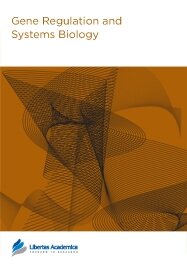

Publication Date: 03 Apr 2014
Type: Original Research
Journal: Gene Regulation and Systems Biology
Citation: Gene Regulation and Systems Biology 2014:8 97-111
doi: 10.4137/GRSB.S14116

Hepatic metabolic gene networks were studied in dairy cattle fed control (CON, 1.34 Mcal/kg) or higher energy (overfed (OVE), 1.62 Mcal/kg) diets during the last 45 days of pregnancy. A total of 57 target genes encompassing PPARα-targets/co-regulators, hepatokines, growth hormone (GH)/insulin-like growth factor 1 (IGF-1) axis, lipogenesis, and lipoprotein metabolism were evaluated on -14, 7, 14, and 30 days around parturition. OVE versus CON cows were in more negative energy balance (NEB) postpartum and had greater serum non-esterified fatty acids (NEFA), β-hydroxybutyrate (BHBA), and liver triacylglycerol (TAG) concentrations. Milk synthesis rate did not differ. Liver from OVE cows responded to postpartal NEB by up-regulating expression of PPARα-targets in the fatty acid oxidation and ketogenesis pathways, along with gluconeogenic genes. Hepatokines (fibroblast growth factor 21 (FGF21), angiopoietin-like 4 (ANGPTL4)) and apolipoprotein A-V (APOA5) were up-regulated postpartum to a greater extent in OVE than CON. OVE led to greater blood insulin prepartum, lower NEFA:insulin, and greater lipogenic gene expression suggesting insulin sensitivity was not impaired. A lack of change in APOB, MTTP, and PNPLA3 coupled with upregulation of PLIN2 postpartum in cows fed OVE contributed to TAG accumulation. Postpartal responses in NEFA and FGF21 with OVE support a role of this hepatokine in diminishing adipose insulin sensitivity.
PDF (1.40 MB PDF FORMAT)
RIS citation (ENDNOTE, REFERENCE MANAGER, PROCITE, REFWORKS)
Supplementary Files 1 (457.15 KB ZIP FORMAT)
BibTex citation (BIBDESK, LATEX)
XML
PMC HTML

Publishing in Gene Regulation and Systems Biology was a very positive experience. I was impressed by the fast and uncomplicated submission process as well as the clear and professional peer review process which helped to improve the manuscript. The Libertas Academica team was very patient and helpful. I would definitely recommend the journal to other colleagues in the field!
Facebook Google+ Twitter
Pinterest Tumblr YouTube